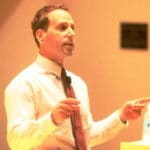Justin Paperny’s Post Federal Prison Personal Narrative
As a federal prison consultant and corporate ethics speaker I frequently encourage others to write their personal narrative. Defendants should write their narrative before federal prison, then they should refine it from federal prison. Then upon their release they should write their, “post federal prison personal narrative”, as I write below.
From The Boardroom to Federal Prison
My name is Justin Paperny. I stand before you as a 44-year-old man who was reared in Encino, California, with a privileged background. I attended Montclair College Prep before moving on to the University of Southern California, where I earned my degree in 1997. From USC I went on to financial success as a stockbroker at Bear Stearns and UBS, then as a real estate agent in the distinguished house of Sotheby’s.

Post Federal Prison Personal Narrative
I qualify my success as merely “financial,” because despite the hundreds of thousands I earned as a young man, I was not a person who placed much value on the importance of ethics. That moral lapse led to my demise, culminating with a struggle through the criminal justice system. In 2007, I pleaded guilty to securities fraud. In 2008, I began serving a sentence inside a minimum-security federal prison camp. In 2009, I walked out from the federal prison in Taft, California, carrying the lifetime stigma of being a convicted felon.
Through this effort to reconcile with society, to atone for the bad decisions I made as a young professional, I make myself available as a case study—a living, breathing example of what happens when an individual fails to make values-based decisions. In Lessons From Prison, a book I wrote while serving my prison term, I show readers that I didn’t begin my life as a stranger to the principles of good conduct, or good citizenship. That slide into ethical gray areas, and then into criminal problems, didn’t begin until I left the University for the professional world. It was as a stockbroker that I began to disregard the timeless advantages of honesty, temperance, balance, and integrity. In my case, those virtues yielded to the ubiquitous vice of greed, corrupting the life I was groomed to lead.
While in federal prison, I lived shoulder-to-shoulder with hundreds of other well-educated, white-collar offenders.
As I had, they graduated from excellent schools and advanced to well-compensated careers of distinction. Yet as I listened to stories about the influences that corrupted the character of my peers in the community of felons—eventually leading to their incarceration—I recognized how many people of promise failed when they disregarded the not-so-tangible value of ethics.
The discipline of moral principles and practice was not lost on me as a child in a Jewish household. Beginning as a six-year-old, and continuing through my graduation from USC, baseball defined me. I was gifted with excellent hand-eye coordination and an early physical development that led me to excel at and love the sport. From Jack Gilardi, my first baseball coach, and from my parents, Bernie and Tallie, I learned that despite my natural talents as a fielder and hitter, no team could win if the individual pursued selfish glory. The team could only play well together if every member embraced the loyalty, the discipline. Without those virtues, the team would fall apart, but with them we could build integrity, good sportsmanship, and become winners, regardless of any individual game’s outcome.

Post Federal Prison Personal Narrative
Such lessons served me well throughout my childhood, adolescence, and my early adulthood.
Success as a team player in baseball led to my playing in three world-series tournaments, to playing baseball at both Montclair Prep and USC. Unfortunately, when I put away my baseball glove to begin my career as a financial professional, I’m ashamed to acknowledge that I also put away my commitment to the rules of ethical conduct. Rather than serving my profession with dignity and honor, I began taking shortcuts that I mistakenly believed would lead to greater and greater rewards. To my chagrin, the story I share shows a different outcome.
After leaving USC, I joined Merrill Lynch and began training under others as an account executive. While studying diligently to pass my accrediting examinations, those who were mentoring me introduced the practical aspects of how to “succeed” as a stockbroker. Like all brokerage houses, Merrill had a corporate code of conduct.
Platitudes about leadership, honesty, and integrity decorated walls in stylish frames, but the culture, my mentors taught me, showed that Merrill rewarded performance, and profits gauged performance.
From those who mentored me as a young broker, I learned that my primary function was to build a book of business. Succeeding would require that I persuade clients to deposit financial resources into Merrill accounts that my mentors and I would manage. Instead of spending time to understand the long-term interests, lifetime investment strategies, and risk-tolerance levels of my clients, those who groomed me for success taught that as a young stockbroker, I served a different function. My job was to cold call, to bring in new clients, to increase the size of assets that we kept under management.
The message I received was that I was in a numbers game. The more people I called, the more likely I was to find new clients.
My mentors celebrated each new prospect with a high five, and I became a master of the cold call. We didn’t have an interest in the direction of the market, nor did we give much thought to price-earnings multiples, balance sheets, dividend yields, or other economic indicators. I didn’t review candlestick charts, trading volumes, or trend lines. Those lessons in fundamental and technical analysis would lead to my passing licensing examinations, but my mentors at Merrill were teaching me the practical aspects of succeeding as a stockbroker. The more money I brought in to manage, the more commissions we would generate to split.
By the time I completed my first year at Merrill, my cold-calling efforts generated nearly $10 million in client assets under management. I had passed my licensing examinations, meaning that instead of earning a nominal salary, I was entitled to a more equitable split of commissions that my book of business generated. Rather than honoring my contribution, however, my mentors would hoard the lion’s share, feeding me crumbs as if I were still a cub.
At the time I was in my early 20’s, and I didn’t grasp the changes, or slide of my moral outlook. Self-interest began to overshadow my earlier appreciation for the values of honesty, discipline, and team building. Questions about the influence or impact my actions would have on the interests of my clients didn’t pang my conscience. As a stockbroker my job—as I saw it—was to bring in more money to manage, and as my mentors generated lucrative commissions by shuffling (a euphemism for churning) client resources into various equities or funds, I wanted my share. Like most white-collar offenders on the wrong side of prison boundaries, I felt entitled.

Post Federal Prison Personal Narrative
Instead of considering what would best serve the interests of my clients, as my supposed fiduciary responsibility required, I contemplated options that might bring me a bigger slice of the commission split.
This selfish motivation contradicted everything I learned as an athlete, but at the time, all I could see was that others were raking in more money than I was—and I wanted my share.
With my primary motivations shifting from the long-term interests of my clients, my employer, or my career to the short-term interests of my next paycheck, I decided to leave Merrill Lynch. From my perspective, it was my individual efforts that brought the $10 million of client resources into managed accounts. There wasn’t any team or commitment to integrity. Just as I had brought these resources into Merrill, I could persuade what I perceived to be “my” clients to switch their business to Crowell Weedon & Co., a smaller brokerage house that hired me as an account executive. At Crowell Weedon, I learned new tricks of the trade.
As an account executive at Crowell Weedon, my responsibilities expanded from simply soliciting new investor money to placing that money into investment vehicles. More experienced brokers introduced me to the art of churning, or promoting funds that paid the highest commissions, and a few other schmoozing tactics that I employed to serve my short-term interests. After a little more than a year at Crowell Weedon, I felt that I had served my apprenticeship and positioned myself to advance to the major leagues of professional money management.
When I graduated from USC, at 22, I was a disciplined young man, leading a balanced life and placing a high value on physical fitness, personal relationships, and my academic career.
At 24, however, I was a different person. Without realizing these changes, I discarded the values that had shaped my adolescence and early adulthood, exchanging them for a cynicism and selfishness that eventually came to corrupt every aspect of my life. Instead of maintaining tip-top physical conditioning, I morphed into an undisciplined blob, ballooning from 165 pounds to more than 200 pounds. I lost my self-respect, and as a consequence all of my personal relationships suffered, including the departure of my college sweetheart. Rather than measuring myself by the character I built, I became obsessed with the money I believed I was entitled to earn. The greed became insatiable, corrupting the core of who I was as a person, rendering me incapable of discerning right from wrong, and eventually leading me into problems with the law, destroying my career, and worse, my name.
By the time I was ready to leave Crowell Weedon, I had built a book of business to $15 million under management. To take it higher, I decided to exploit personal relationships wherever I could. Although I had reached the top of my athletic career as a college ball player, many of my friends, including my closest friend Brad Fullmer, went on to become stars in professional baseball, earning millions of dollars in annual revenues. Recognizing that these athletes would need to invest their fortunes, I set up a meeting with a fellow Trojan, Danny, who had gone on to build a career as an influential sports agent in Beverly Hills for professional athletes.
In approaching the agent, my intentions were to persuade him to recommend me as a stockbroker to the athletes he represented. His former fraternity brother, Kyle Smith, was a stockbroker at Bear Stearns, the agent said, and Kyle represented all the agent’s clients. Since we were all USC alumni and all affiliated with fellow ballplayers, the agent set up a meeting between Kyle and me, suggesting that Kyle and I become partners.
That meeting with Kyle Smith led to my quitting Crowell Weedon to join Bear Stearns, and I brought the clients I had cultivated with me. Kyle’s book of business exceeded $40 million under management, and with the $15 million I brought, we had the beginnings of a partnership that could generate substantial trading commissions. At 25, I was the youngest broker Bear Stearns had ever brought into its prestigious Century City office.

Post Federal Prison Personal Narrative
When Bear Stearns gave me the desk, the business cards, and the income potential, it gave me an identity. On the first day as a Bear Stearns account executive, the legendary Ace Greenberg called to welcome and wish me success. I became a bit full of myself, relishing in the vanity of having arrived. A responsibility came with the opportunity, however, and I’m embarrassed to say that I didn’t live up to it. Despite the arrogance of believing that I understood the profession of money management, all I really focused on was the amount of commissions that my partnership with Kyle generated—my proportion of the commission split.
As the junior partner I resented that I received a fraction of every dollar that Kyle and I earned in commissions.
I felt as if my contributions warranted a higher payout. It didn’t matter to me that in my mid-20’s my monthly commission checks exceeded $20,000 every month. A bitterness festered that my compensation paled in comparison to the monthly checks of more than $50,000 that Kyle was bringing home. I rationalized this unfairness convincing myself that this injustice could not stand. I felt entitled to more, and when I saw opportunities to increase my earnings, I took them. As money became my sole source of validation, I found it easier to justify actions that would result in my taking care of myself even if the partnership wouldn’t.
Many of the clients that Kyle and I managed were professional athletes who had become household names. Their wealth was of such a magnitude that the athletes were not interested in being bothered with the minutiae of how we managed their accounts. They trusted us to make decisions on their behalf, but in our case, that trust was misplaced. Kyle and I had a conflict because our incomes depended on the commissions we generated through the trades we made on behalf of our clients. We abused our clients’ trust by moving their assets in and out of positions for the benefit of higher commissions.
Like all brokerage houses, Bear Stearns kept a written code of ethics and a compliance officer who ostensibly governed the conduct of stockbrokers.
That written code of ethics existed in binders that no one ever opened, and the spirit of the compliance officer approximated that of the “counselor” casinos provided on-site “to treat” customers with gambling addictions. Rather than chastising Kyle and me for the frequent trading, Bear Stearns paid us substantial bonuses, tacitly encouraging our actions.
That encouragement from Bear Stearns fed our lust for a bigger book of business, and I found new resources in the lightly regulated hedge-fund industry. Hedge funds, in fact, became an ideal source of funds for our book of business because the hedge-fund manager would have an ongoing interest in increasing the size of their deposits. In effect, the hedge-fund managers would become a quasi-sales force, bringing even more resources into the overall book of business that Kyle and I managed. This strategy of pursuing hedge funds enabled us to build our book of business to a level approaching $200 million.
Kyle and I discovered another advantage of focusing on hedge funds. Rather than accepting responsibility for selecting which investment vehicles to buy or sell, Kyle and I earned commissions as the hedge fund managers selected trades. Further, aggressive hedge fund managers would use three-to-one leverage in their accounts to borrow money from the brokerage. In other words, margin loans we made available allowed clients to take $30 million dollar positions on stocks when the hedge fund manager only had $10 million of investor money. Those margin loans enabled Kyle and me to boost our income further through the interest payments the loans generated. We had found the sweet spot in the brokerage business, sometimes earning six-figure monthly paychecks while shrugging off client responsibility and reserving enough time each day for golf.

Post Federal Prison Personal Narrative
As our book of business grew, Kyle and I recognized the value we had “created” for any brokerage firm. Just as aggressive trading patterns generated substantial commissions for us, Bear Stearns profited handsomely. Account records showed that while we benefited from the book of business, the individual clients who had made the actual deposits didn’t fair so well. The client losses didn’t matter, as the brokerage firm, as well as Kyle and I, received commissions with every purchase and sale. Rather than concerning ourselves with client losses, Kyle and I were looking for ways to enhance our own earnings. We gladly accepted six-figure “signing bonuses” to pull our book of business from Bear Stearns and run our operations from UBS, a competing brokerage house. UBS wanted in on the action, and for the right price to Kyle and me, we gladly switched our allegiance.
As commissions from aggressive trading continued to flow to UBS, as well as to Kyle and me, we could not ignore the unusual patterns in one of the hedge funds we oversaw.
Despite repeated losses of millions of dollars in client funds through bad trades, the hedge fund continued to attract millions in deposits from new, unsuspecting investors. This was prima facie evidence of some sort of fraud and everyone with access to the records urged us to protect ourselves. Rather than confront the evidence and thereby kill the commissions that flowed from the hedge fund in question, we generated a letter of disclosure with hopes that it would shield us against liability that we anticipated from the hedge fund.
This was the typical culture I am now ashamed to have participated in and contributed to during my tenure as a young stockbroker. Instead of making decisions rooted in trustworthiness, fairness, and a commitment to transparency, I joined an unscrupulous lot. In time I became locked in a myopic cycle of selfishness, striving to inflate my pay without regard to the principles of good conduct.
A willful blindness to wrongdoing was one thing, but a time came when my level of culpability crossed a line, rising from violations of ethics and morality to clear violations of securities laws.
That moment came during a meeting I attended where an investor of the questionable hedge fund presented incontrovertible proof of fraud. The investor had in his possession an account statement from UBS verifying that he had equities in his account with a value in excess of $3 million. Since magnificent trading losses by the hedge fund manager had depleted the total balance to far less than $1 million, I knew with certainty that the hedge fund manager had presented the investor with forged financial statements.
An appropriate course of action would have been for me to report the fraud to the investor, to my superiors, and to appropriate authorities. Instead, I dissembled, effectively lying to protect my client—the hedge fund manager—by allowing the investor to believe that his account was in good standing. In fact, the hedge fund manager was in the midst of a Ponzi scheme, and my failure to report the fraud contributed, making me a co-conspirator.
Upon leaving that meeting, the sickness in my stomach confirmed that I had committed a pernicious act. In not expressing my client’s fraud I had engaged in a crime. I wanted to convince myself that it wasn’t me who had done anything wrong, but efforts to ignore my silence at a crucial moment did not appease the guilt I felt inside. I felt dirty, not because I had profited from what I had suspected all along was my client’s fraud, but because I knew that someday I would have to pay for my decision to remain silent about the fraud during that meeting. Despite the inner guilt, I didn’t have the strength within me to accept responsibility and try to redeem myself. Instead, that day was simply a continuation of my long slide to self-destruction. It began with a diminishing commitment to ethical behavior after I left USC, and culminated with my term in federal prison.
In the months that followed that meeting with my client and his investor, an investigation began that resulted in my being fired. Then concerns over civil liabilities led to my six-figure legal fees.
I stayed in denial for more than a year, exacerbating the costs of my wrongdoing on every level, including financial, emotional, psychological, and even biological. I didn’t want my family to know that I had been complicit in a fraud nor did I want my reputation to suffer. I lied to people, including my lawyers and the FBI, encouraged others to lie, tried to cheat my way through lie detector tests, all in a futile effort to delay what I knew was inevitable. Only the imminent threat of a more severe sanction from the criminal justice system brought me to confront my conscience, beginning this long journey of, step-by-step, striving to set things right for the wrong I had done.
While serving my term in federal prison, I had time to reflect on when and how I had begun to go wrong. That introspection helped me grasp the true costs of abandoning the ethical principles I had been groomed to embrace in childhood and through my University years. When I entered the workforce I became consumed with the lust for a higher paycheck, no matter what the cost to my reputation. I began to justify looking out for my own needs, feeling as if I was entitled to more. The pressure to earn more led me to rationalize my actions, and when opportunities presented themselves, I seized them.
Without a commitment to ethics, I learned the hard way, that pressure, rationalization, and opportunity makes a person susceptible to what others have called the “fraud triangle”.
While in federal prison I heard stories from scores of men who once led distinguished careers as accountants, lawyers, and businessman. Like me, they were men who graduated from great Universities, men who didn’t set out to scheme or rob, men who couldn’t fathom the possibility of ever encountering such personal disgrace and failure. Yet like me, their lives—and their families’ lives—were uprooted because of bad decisions that began with a disregard for the importance of making values-based decisions.
In retrospect, I realize the arrogance of having once believed that I was “entitled” to anything.

Post Federal Prison Personal Narrative
Every individual has a responsibility, a duty to live as a good citizen and to abide by the principles of good conduct. In failing to recognize that decisions I made would have consequences, not only for me, but also for my employer, my family, my unborn children, and for others in society, I lived in a willful blindness, the costs for which I’ll spend a lifetime paying.
As I did in federal prison, I will continue to invest hours every day contemplating the motivations, behaviors, and consequences that resulted in my struggle with the criminal justice system. I will fulfill my obligations to live as a contributing citizen, thirsty for forgiveness, insight, and perspective that, in time, might help expiate the shame and guilt weighing upon my shoulders. By sharing this story and making myself available to respond with questions, I hope to help my fellow citizens appreciate the wisdom of honesty, transparency, temperance, balance, integrity, and the other virtues of good citizenship.
Justin Paperny

